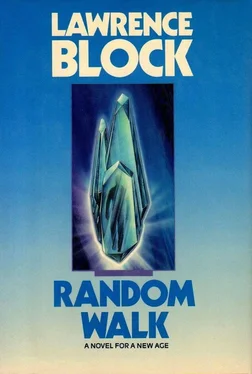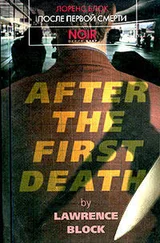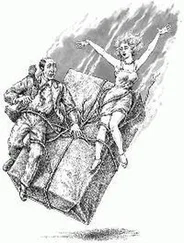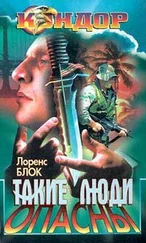“It’s pretty simple,” Guthrie told him. “The main thing is you have to remember to alternate feet.”
“Left right left right.”
“That’s the idea.”
“Well, I’ll concentrate on it,” Jody said. “By an’ by, I might could get the hang of it.”
In Chicago, the bus terminal in the Loop had coin-access cubicles in the restrooms where you could take a sponge bath, freshen up, and change your clothes. When Sara emerged from the ladies’ room Thom was waiting for her. Downstairs, she sat with their suitcases while he picked out a couple of paperback science fiction novels. He had already read fifty pages of one when it was time to board their bus for Salt Lake City.
They sat together four seats in back of the driver. She’d given Thom the window seat. Across the aisle, a very thin man with a sallow complexion was dosing himself with cough medicine. He had the whole seat to himself. Directly in front of him, a middle-aged couple sat holding hands. Thom looked out the window until the bus had left city traffic for the Stevenson Expressway. Then he returned to his book.
Sara sat with her eyes closed most of the time. She slept some, but it was difficult to tell where consciousness left off and sleep began. Her sleep was light and dream-ridden, her conscious periods hazy and dreamlike. Movies revealed themselves to her mind’s eye. Snatches of speech sounded in her mind. Sometimes it was of a piece with what she was seeing, sometimes not.
South and west of Joliet the bus left Route 55 for Interstate 80, the road it would stay with clear through to Salt Lake City — and, after she and Thom left it, all the way on to San Francisco. They crossed into Iowa at Davenport, and Thom nudged her awake as they moved onto the bridge across the Mississippi. She looked out the window. Her field of vision was too narrow to show her much, but when she sat back and closed her eyes she saw the entire river, from its headwaters at Lake Itasca to its delta at New Orleans. She could see, in one panoramic view, the whole great river through all its history — paddle-wheelers, Indians in war canoes, Huck and Jim on a raft, mills and factories spilling chemicals into the water, jet contrails overhead. People battling the rising waters, stacking sandbags to stop a flood. Railroad bridges, bridges for cars. Ox-drawn prairie schooners crossing on ferries. Eyes closed, her field of vision was so great that it could encompass all the river’s time and space without any shrinkage or loss of detail, and it was all in flux, all in motion, all evolving not before but behind her eyes—
“I wish you could see this,” he said.
“Oh, Thommy,” she said, and clutched his arm. “Oh, if you could see what I see—” He wanted to know what she meant and she told him about it, described what she saw and heard and sensed and felt and knew of the river.
He was in awe. “You see all that? How does it all fit at once?”
She took his book from him, pointed at the page he was reading. “How big a picture would you need to hold everything on this page?”
“A pretty big one,” he allowed, but he still couldn’t comprehend how she saw what she saw, and she didn’t know how to get it across to him.
“But it’s wonderful,” she said. “I never knew what a river was.”
“You didn’t?”
“Well, what’s a river, Thom?”
“Water going someplace, I guess. In a straight line, except sometimes they’re not straight, they meander. Bigger than a creek or a stream, and moving fast enough so there’s a current, and I think it has to be fresh water—”
“That’s a definition,” she said. “That’s how you look at a body of water and decide whether or not it’s a river, by whether or not it fits certain standards. But what’s the river?”
“What you just said. A body of water that fits certain what-you-said. Standards.”
“What part is the river? The water?”
“I guess.”
“But it’s only in the river for a while. It flows in from some other stream and flows out into the Gulf of Mexico. There’s always new water coming in and old water flowing out. So what’s the river? The land on either side is the bank of the river, the mud underneath is the bottom of the river, but what’s the river?”
“I don’t know.”
“I think the river’s a certain time and space,” she said, “and sooner or later every drop of water in the world gets to take its turn being a part of it. And then they go somewhere else. This drop goes to the Gulf, and this drop evaporates, and somebody drinks this drop—”
“And this little drop goes to market, and this little drop stays home—”
“A little of the worlds energy is gathered up into a river,” she said, “and the water makes sure it’s never empty.”
Iowa City and Des Moines. Rolling hills in eastern Iowa, then the plains in the west. The highway was straight as a die west of Des Moines, and almost perfectly flat. They crossed the Missouri into Nebraska and stopped at the terminal in Omaha. They had covered almost five hundred miles since leaving Chicago ten hours ago.
They had half an hour to eat before they had to reboard the bus. There was a restaurant in the bus terminal but it didn’t feel right energetically, and when she closed her eyes she saw slivers of broken glass. The people in the booths and at the counter had the air of the hunt about them, as if they were all at once predators and victims.
She took Thom’s arm and led him back into the terminal and across the lobby to the Farnam Avenue entrance. On the sidewalk, she turned without hesitation to the right and walked half a block, where they found a brightly-lit cafeteria between two stores that had closed for the weekend.
The place was clean, the prices reasonable, and the food decent. An old man with wispy white hair smiled shyly from an adjacent table, then went back to his newspaper crossword puzzle. On the sound system, an orchestra was playing “Moonlight in Vermont.”
He went back for a second glass of milk. She sipped her tea. He said, “Mom, you knew this place’d be here, didn’t you?”
“I knew something would be here.”
“Did you like see a picture of it?”
“Not exactly. Let me try to remember.” She closed her eyes. “I sort of saw us sitting at a table.”
“You saw us?”
“I saw the idea of us,” she said. “And I walked to where that would be, and here we are.”
“This is pretty weird, Mom.”
“No kidding.”
“Were those Indians in the bus station? Over by the lockers?”
“They certainly looked like Indians.”
“Is this the West?”
“Well, I think so. We’re west of the Mississippi. We just crossed the Missouri. Of course you don’t have to be this far west to see Indians. There are Indians all over the country.”
“Indians. Can I have a horse?”
“A seeing-eye horse.”
He started to giggle and was quickly convulsed with laughter. “Oh, you’re bad,” he said. “You’re really bad.”
They were back in their same seats when the bus pulled out of Omaha. The thin man with the cough syrup had gone, and in his place sat a light-skinned black woman wearing a scarf. The middle-aged hand-holders were gone, too, and a young soldier in uniform sprawled over both the seats they had occupied.
They crossed the Platte, skirted Lincoln, crossed the Platte again at Grand Island, hugged its northern bank for a hundred miles and crossed it a third time, following the south fork and then Lodgepole Creek into southern Wyoming. They had another meal break in Cheyenne, let off passengers, took on passengers, and rolled on west through Laramie and Rock Springs.
It was dark as they rode through Wyoming. But she could see. They reached the foothills of the Rockies as they neared Laramie, and she saw the mountains and felt the magnetic power of them. She saw bighorn sheep, surefooted on the sheer slopes, the rutting males clashing head-on in ritual combat, saw mountain goats white and silent, gazing motionless over the valleys. She saw the mountains forming, willing their way upward out of the earth’s convexity, stretching like plant growth toward the sun. She saw mountain men, fur-clad hunters and trappers as solitary as bears or badgers. She saw prospectors, she saw hard-rock miners from Wales and Cornwall. She saw the buffalo dying, carcasses rotting in the sun, and she saw the land sliced by rail lines and cordoned off with fences. She saw Stone Age people who’d lived in the mountains and left not a trace of their presence, and she saw Indian wars, and she saw ranch houses with big dish TV antennas and solar-powered generators.
Читать дальше








